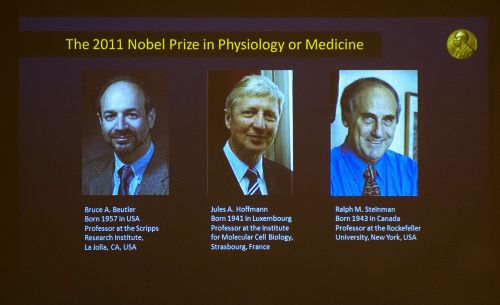STOCKHOLM (AP) -- Three scientists won the Nobel Prize in medicine on Monday for discoveries about the immune system that opened new avenues for the treatment and prevention of infectious illnesses and cancer.
American Bruce Beutler and French scientist Jules Hoffmann shared the 10 million-kronor ($1.5 million) award with Canadian-born Ralph Steinman, the Nobel committee at Stockholm's Karolinska institute said.
Beutler and Hoffmann were cited for their discoveries in the 1990s of receptor proteins that can recognize bacteria and other microorganisms as they enter the body, and activate the first line of defense in the immune system, known as innate immunity.
Steinman was honored for the discovery two decades earlier of dendritic cells, which help regulate adaptive immunity, the next stage of the immune system's response, when the invading microorganisms are purged from the body.
``Their work has opened up new avenues for the development of prevention and therapy against infections, cancer and inflammatory disease,'' the citation said.

Prize committee member Hans-Gustav Ljunggren told The Associated Press that drug companies are using the discoveries to develop better vaccines, though none are on the market yet.
``Some vaccines against hepatitis are coming out, large clinical trials are being done today,'' Ljunggren. ``More vaccines against infectious diseases are coming and long-term it will also be possible to use it to improve the treatment of cancer, auto-immunity and chronic inflammatory diseases.''
Beutler, born in 1957, is professor of genetics and immunology at The Scripps Research Institute in La Jolla, California. Hoffmann, 70, headed a research laboratory in Strasbourg, France, between 1974 and 2009 and served as president of the French National Academy of Sciences between 2007-2008.
Steinman, 68, has been affiliated with Rockefeller University in New York since 1970, and heads its Center for Immunology and Immune Diseases.
Hoffmann's discovery came in 1996 during research on how fruit flies fight infections. Two years later, Beutler's research on mice showed that fruit flies and mammals activate innate immunity in similar ways when attacked by germs.
Steinman's discovery dates back to 1973, when he found a new cell type, the dendritic cell, which has a unique capacity to activate so-called T-cells. Those cells have a key role in adaptive immunity, producing antibodies that destroy infections. Once the infection has been stopped, the immune system maintains a memory that helps it mobilize its defenses next time it comes under a similar attack.
The trio's discoveries have enabled the development of new methods for treating and preventing diseases, including improved vaccines and in attempts to help the immune system to attack tumors, the committee said.
The medicine award kicked off a week of Nobel Prize announcements, and will be followed by the physics prize on Tuesday, chemistry on Wednesday, literature on Thursday and the Nobel Peace Prize on Friday. The winners of the economics award will be announced on Oct. 10.
The coveted prizes were established by wealthy Swedish industrialist Alfred Nobel _ the inventor of dynamite _ except for the economics award, which was created by Sweden's central bank in 1968 in Nobel's memory. The prizes are always handed out on Dec. 10, on the anniversary of Nobel's death in 1896.
Last year's medicine award went to British professor Robert Edwards for fertility research that led to the first test tube baby.
<한글기사>
노벨의학상에 보이틀러·호프만·슈타인만
"면역체계 활성화 핵심 원칙 발견" 공로 인정
올해 노벨 생리의학상 수상자로 면역체계 활성화에 획기적 연구 업적을 이룬 브루스 A. 보이틀러(53·미국), 율레스 A. 호프 만(70·룩셈부르크), 랠프 M. 슈타인만(68·캐나다) 등 3명이 선정됐다.
스웨덴 카롤린스카 의대 노벨위원회는 3일(현지시간) "올해 노벨상(생리의학상 지칭) 수상자들은 면역체계의 활성화를 위한 핵심 원칙들을 발견해 면역체계에 대한 우리의 이해를 혁신시켰다"며 이같이 발표했다.
올해 노벨 생리의학상 수상자 3인은 외부 병원체의 인식 단계부터 면역반응 활 성화에 이르기까지 면역체계의 전반적인 작용을 규명함으로써 질병 기전 이해에 새 로운 지평을 열었다고 노벨위원회는 설명했다.
보이틀러와 호프만은 외부에서 침입한 병원체를 인식하는 수용체를 발견하고, 이 수용체에 의해 시작되는 초기 면역반응, 즉 선천성 면역반응을 규명했다.
슈타인만은 항원에 특이한 면역, 즉 획득 면역을 활성화하는 새로운 유형의 면 역세포를 발견하고 이를 '수지상 세포'라고 명명했으며, 획득 면역의 작용 과정을 밝혀냈다.
노벨위원회는 이들이 선천성 면역과 획득 면역의 작용 기전을 규명한 결과 감염 질환과 암, 염증질환의 예방과 치료제 개발에 새장이 열렸다고 평가했다.
한편, 노벨 생리의학상 상금 1천만크로네(약 17억원)의 절반을 슈타인만이 획득 하며 보이틀러와 호프만이 나머지 500만크로네를 반씩 나눠 받는다고 위원회는 설명 했다.
















![[KH Explains] Hyundai's full hybrid edge to pay off amid slow transition to pure EVs](http://res.heraldm.com/phpwas/restmb_idxmake.php?idx=652&simg=/content/image/2024/04/18/20240418050645_0.jpg&u=20240418181020)

![[Today’s K-pop] Zico drops snippet of collaboration with Jennie](http://res.heraldm.com/phpwas/restmb_idxmake.php?idx=642&simg=/content/image/2024/04/18/20240418050702_0.jpg&u=)